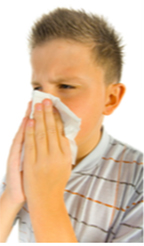DC Says “Take 3” Actions to Fight Flu.
1. The first and most important steps is to get a flu vaccination each year.
- If you get sick with flu, take prescription antiviral drugs if your doctor prescribes them. Early treatment is especially important for the elderly, young children, people with certain chronic health conditions, and pregnant women.
- Take everyday preventive actions that help slow the spread of germs that cause respiratory (nose, throat, and lungs) illnesses, like flu.
How does flu spread?
Flu viruses are thought to spread mainly from person to person through droplets made when people with flu cough, sneeze, or talk. Less often, a person might get flu by touching a surface or object that has flu virus on it and then touching their own mouth, nose, or possibly eyes. Many other viruses spread the same way. People infected with flu may be able to infect others beginning 1 day before symptoms develop and up to 5 to 7 days after becoming sick. That means you may be able to spread flu to someone else before you know you are sick as well as while you are sick. Young children, those who are severely ill, and those who have severely weakened immune systems may be able to infect others for longer than 5 to 7 days.
What are everyday preventive actions?
- Avoid close contact with people who are sick.
- While sick, limit contact with others as much as possible to keep from
infecting them.
- Cover your nose and mouth with a tissue when you cough or sneeze. Throw it in the trash after you use it and wash your hands.
- Wash your hands often with soap and water for at least 20 seconds. If soap and water are not available, use an alcohol-based hand rub.
- Avoid touching your eyes, nose and mouth. Germs spread this way.
- Clean and disinfect sur-faces and objects that may be contaminated with germs that can cause respiratory ill-nesses like flu.
- For flu, CDC recommends that you (or your child) stay home for at least 24 hours after fever is gone except to get medical care or for other necessities. Fever should be gone without the use of a fever-reducing medicine. The stay-at-home guidance for COVID-19 may be different.
- In the context of the COVID-19 pandemic, local governments or public health departments may recommend additional pre-cautions be taken in your community. Follow those instructions.
What additional steps can I take at work to help stop the spread of germs that can cause respiratory ill-ness, like flu?
- Find out about your employer’s plans for out-breaks of flu or another illness and whether flu vaccinations are offered on site.
- Routinely clean and disinfect frequently touched objects and surfaces like doorknobs, keyboards, and phones, to help remove germs.
- Make sure your workplace has an adequate supply of tissues, soap, paper towels, alcohol-based hand rubs, and disposable wipes.
- Train others on how to do your job so they can cover for you in case you or a family member gets sick and you have to stay home.
- If you begin to feel sick while at work, go home as soon as possible.
- Find out about plans if your child’s school, child childcare program, or college has an outbreak of flu or another illness and whether flu vaccinations are offered on-site.
- Make sure your child’s school, childcare program, or college routinely cleans and disinfects frequently touched objects and surfaces, and that they have a good supply of tissues, soap, paper towels, alcohol-based hand rubs, and disposable wipes on-site.
- Ask how sick students and staff are separated from others and who will care for them until they can go home.
- In the context of the COVID-19 pandemic, local governments or public health departments may recommend additional precautions be taken in your community. Follow those instructions.
Everyday preventive actions can help slow the spread of germs that can cause many different illnesses and may offer some protection against flu.
